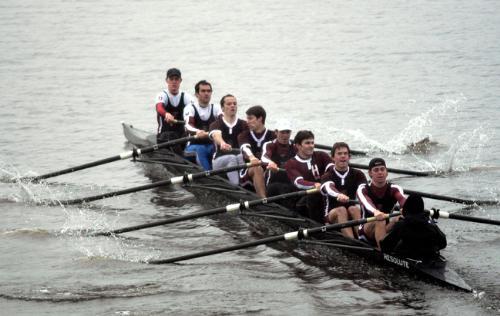
News
Summers Will Not Finish Semester of Teaching as Harvard Investigates Epstein Ties

News
Harvard College Students Report Favoring Divestment from Israel in HUA Survey

News
‘He Should Resign’: Harvard Undergrads Take Hard Line Against Summers Over Epstein Scandal

News
Harvard To Launch New Investigation Into Epstein’s Ties to Summers, Other University Affiliates

News
Harvard Students To Vote on Divestment From Israel in Inaugural HUA Election Survey
Men’s Lightweight Crew Stumbles Into Fourth

In a highly contested field of evenly-matched teams, the Harvard men’s lightweight crew team could not live up to its billing at top seed, taking fourth place at the Eastern Association of Rowing Colleges (EARC) Sprints Championships.
Pre-race favorites have not fared well at all this season, as several squads have pulled off upsets to climb in the rankings only to be cast back down within a few weeks’ time.
Such has been the case for each of the lightweight squads in yesterday’s race. Every squad entered the Sprints with at least one defeat to its name, testifying to the overall strength of the pool.
“In terms of rankings, we don’t put much stock in them,” captain Nick Blannin said. “We knew that if we didn’t perform at our best, we didn’t have a good chance of winning.”
It was this strength—and not poor execution of racing strategy—combined with a tough headwind that condemned the Crimson to defeat.
“The guys rowed hard and pretty aggressively,” Blannin said. “We were rowing into a pretty strong headwind. It seems that the crews that won were able to handle the rougher water [and] the conditions better.”
Harvard battled its way through qualifying—and in so doing, extended its record streak of consecutive Grand Finals appearances to 58.
“It was a real dogfight to make it in,” junior Alex Binkley said. “Princeton was the last one to qualify.”
But the fifth-seeded Tigers emerged victorious in the finals, shooting off the line and stealing away with the momentum.
“Princeton did a good job of making it tough on us by getting out ahead,” Blannin said. “Whether we could have made a single move to get out is probably not the case.”
Despite a clean start by the Crimson, Yale and the Tigers cleared the rest of the field and established themselves as the boats to beat, battling for early race position. Harvard, meanwhile, attempted to fight off Columbia just to maintain the third spot.
Slowly, the Crimson and Lions inched their way up toward the lead boats, narrowing the gap over the course’s middle 1000 meters.
But with 500 meters remaining, time was rapidly disappearing. The Bulldogs had begun to fade, slowly dropping back into a three-boat chase pack with Columbia and Harvard, but Princeton would relinquish no more of its advantage.
“Princeton was just too far ahead,” Binkley said. “It’s hard to catch up four seconds over 500 meters. You almost have to count on a boat to slow down.”
Unable to catch the Tigers, the Crimson’s oarsmen focused on fending off the Lions’ push, but to no avail.
Columbia passed Harvard in the last 500 meters but never established any separation as the three-crew pack headed for the finish.
“I don’t even know what the final margin was, but it was close,” Binkley said.
The Lions nipped both Yale and the Crimson at the line by less than six-tenths of a second to take second place.
“[Columbia has] been known as a crew that doesn’t generally have a good start,” Binkley said. “But they make it up on the open water.”
Harvard’s second varsity eight finished sixth in its Grand Finals.
The Crimson lightweights return to action when they travel to the IRA National Championships on the Cooper River in Camden, N.J. on May 31.
“The speed at Sprints doesn’t necessarily correlate to the speed at IRAs,” Blannin said. “We’ve got to make ourselves faster, and hopefully we’ll be up there at the top at IRAs.”
—Staff writer Timothy J. McGinn can be reached at mcginn@fas.harvard.edu.
Want to keep up with breaking news? Subscribe to our email newsletter.
